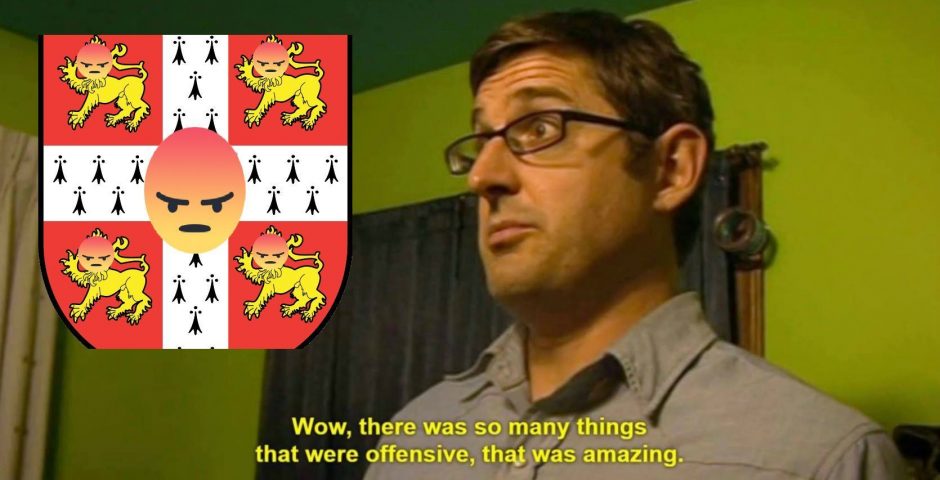
What’s gone wrong with Grudgebridge?
The popular Facebook page isn’t a platform for hate speech. It is hate speech.
Until recently, I liked Grudgebridge. Every time someone cycled down Sidney Street the wrong way, used the word "wholesome" without irony, or shamelessly stole my food from the fridge, I had an easy way of expressing my wrath. Instead of taking up smoking or writing an angry Tab article (lol), I could submit a Grudgebridge.
In theory, the page could be the best possible system for both the offended and offending parties. By sending a qualm to the admins to post anonymously, I would be liberated by anonymity, those who read it would/could laugh, and anyone on the receiving end would be none the wiser, as long as the post wasn't too specifically directed. Rather than abusing someone down a corridor, a good Grudgebridge was more like shouting within a noisey crowd. No one would need to be hurt, and eventually one's grudge would fade into insignificance.

If Grudgebridge was music therapy…
Rather than giving weight to anger, Grudgebridge could satirise it. It parodied Cantabs at their most cynical and bitter and, through humour, it provided a bit of perspective. At a dark moment, I could read various nuggets of hyperbolic misery and realise that I didn't need to take myself so seriously. The experience is not unlike listening to The Smiths; after Morrisey's bitterness, you feel strangely replenished. Wholesome, even.
But that joke isn't funny anymore. Amongst the light-hearted rage, there's genuine hate. There has been an ugly rash of Grudgebridges attacking people's politics, beliefs, and even gender. I'm not the first to observe that the seemingly satirical and banal context of the page legitimises this abuse. On top of this, anonymity protects the cowardly aggressors and because of that Grudgebridge has effectively harboured cyberbullies.

Often, supposed defences of freedom of speech are unnecessarily combined with personal insults.
However, even amongst this charmless, borderline hateful content there was still, just about, an argument for Grudgebridge. Though a lot of the content was vile, there seemed to be a democratic principle giving it all coherence.
If Grudgebridge published all submissions, providing they were legal, it could claim to be a platform for absolute freedom of expression. You could even argue that this platform redresses a power balance, that anonymity empowers those who would otherwise feel too afraid to express themselves, and that in some cases, such empowerment is helpful.
But recently, it's become clear that Grudgebridge is not this platform, or even a platform at all. A platform does not have a voice of its own. Take this comment as an example:

It's clear that the Grudgebridge admins choose what to publish, not just on the grounds of style, but also in terms of content. The admins aren't just giving a platform to other people's anger or hate, but are instead expressing their own. The above comment deliberately deters someone from submitting their grudges, and denies their legitimacy as a platform available to all.
Let's take a look at the page's history. It was founded at Peterhouse last Lent term by a couple of second years, reportedly with little intention but to parody the popular Crushbridge. After that, the small admin team lost interest, and the page changed ownership. It has since evolved into a many-headed monster, with no clear consistency, and no sense of proper responsibility.

The original home of Grudgebridge
Whoever the admins are, they have shown themselves to be undeserving of their anonymity. They are not posting submissions blindly, which would, in a limited sense, be fair. They are arbitrarily and actively choosing those that are abusive above those that are "boring", in the name of "interest". This discrimination makes them all the more culpable for spreading hatred than they would otherwise be.
In their recent controversies, which culminated in the short death and subsequent resurrection of the page, the current admins have shown their true colours. They seem just as interested in their own power as providing a "platform" for the venting of others.
So let's be clear: Grudgebridge is a very small group of students playing Wizard of Oz, sitting behind a small curtain whilst they project a scary, if slightly ridiculous, image. They may tell the Tin Man he has no heart, or the supervision partner he has no brain, but at the end of the day they are as vulnerable as the rest of us. Let's hope they realise it sooner rather than later.









































